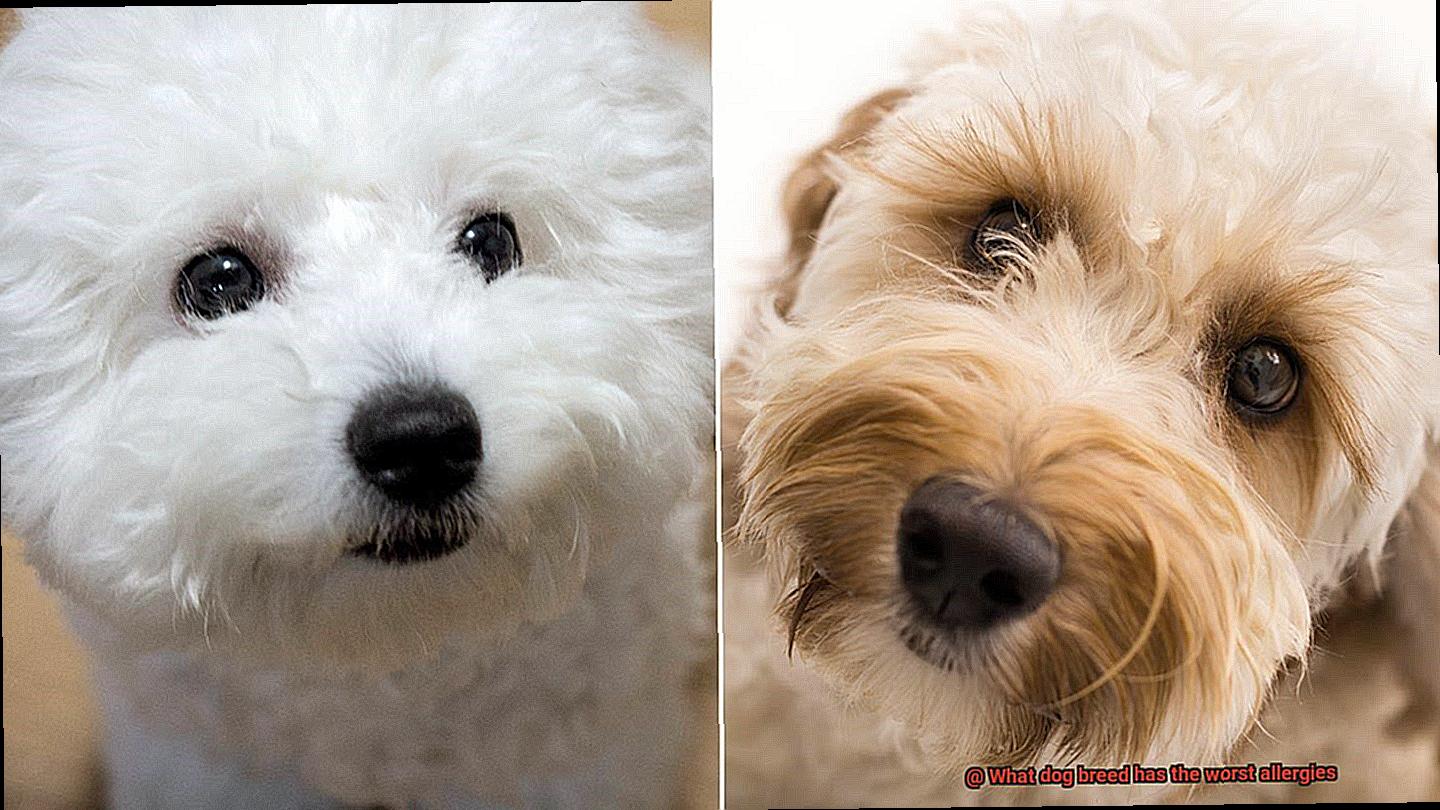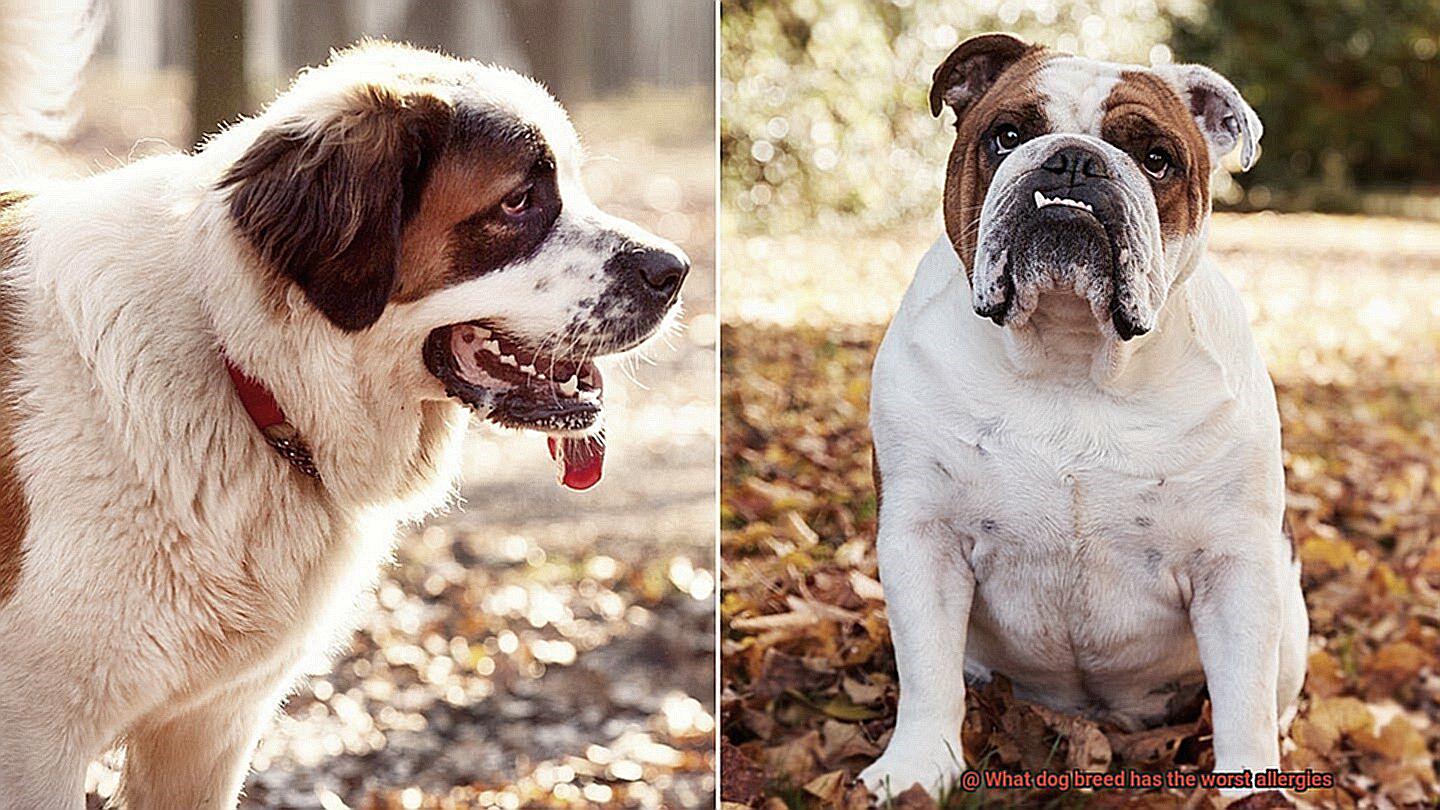What dog breed has the worst allergies?
Are you a devoted dog lover plagued by pesky allergies? The quest to find your perfect furry companion can feel like tiptoeing through a minefield of uncertainty. But fear not. We’re here to unravel the enigma and answer the burning question on every allergy-prone dog enthusiast’s mind: which breed is notorious for unleashing the most ferocious allergic reactions?
While allergies are as unique as each individual, certain dog breeds have earned a reputation for pushing even the sturdiest immune systems to their limits. In this blog post, we’ll embark on an exhilarating journey into the captivating world of dog breed allergies. Prepare yourself for sneezing fits and itchy eyes as we dive headfirst into fascinating facts, shedding light on which pooches bear the brunt of allergy sufferers’ woes.
Whether you’re desperately seeking solace from your canine-induced sniffles or simply curious about how genetics play a role in these furry foes, our aim is to provide engaging insights while maintaining an approachable and informative tone.
So buckle up and join us on this wild ride through the tangled maze of dog breeds and allergies, where we’ll uncover answers to the age-old question that has left many potential pet parents scratching their heads: which breed carries the heaviest burden when it comes to allergies?
The Common Symptoms of Allergies in Dogs
Contents
- 1 The Common Symptoms of Allergies in Dogs
- 2 Potential Causes of Allergies in Dogs
- 3 Identifying the Dog Breed Most Susceptible to Allergies
- 4 Early Detection and Proper Diagnosis for Allergy Suffering Dogs
- 5 French Bulldogs: A Closer Look at Their Susceptibility to Allergies
- 6 Boxers, Golden Retrievers, and Labradors: Other Breeds Prone to Allergies
- 7 Managing and Treating Dog Allergies Effectively
- 8 Minimizing Allergens in Your Home for Your Dog’s Comfort
- 9 Conclusion
Allergies can cause discomfort and distress for our furry friends, but with early detection and proper treatment, we can help alleviate their symptoms and improve their quality of life. In this article, we’ll explore the telltale signs of allergies in dogs, with a focus on French Bulldogs. So, let’s dive in and become allergy detectives for our beloved pups.
Itching and Scratching Excessively:
One of the most noticeable symptoms of allergies in dogs is excessive itching and scratching. If you observe your French Bulldog constantly biting, licking, or chewing their paws, legs, or other body parts, it may indicate an allergic reaction.
Skin Irritation and Inflammation:
Allergies can cause skin irritation and inflammation in dogs. Keep an eye out for redness, rashes, hot spots, or hives on your French Bulldog’s skin. These reactions can make them uncomfortable and may lead to further complications if left untreated.
Ear Infections:
French Bulldogs with allergies are prone to ear infections. Watch for signs such as redness, swelling, discharge, and a foul odor from their ears. If you notice these symptoms, consult your veterinarian for appropriate treatment.
Respiratory Issues:

Allergies can affect your French Bulldog’s respiratory system. Sneezing, coughing, wheezing, and difficulty breathing may indicate an allergic reaction. If you observe these symptoms persistently or severely, seek veterinary advice promptly.
Gastrointestinal Problems:
Some dogs with allergies may experience gastrointestinal issues such as vomiting, diarrhea, flatulence, or loss of appetite. Pay attention to changes in your French Bulldog’s eating habits and digestive functions, as they may be related to allergies.
Eye-Related Symptoms:

Allergies can also manifest as eye-related symptoms in dogs. Your French Bulldog may show signs of redness, itchiness, watery eyes, or even conjunctivitis. Keep an eye out for these symptoms and consult your veterinarian if they persist.
Behavioral Changes:
Allergies can cause behavioral changes in dogs. Your French Bulldog may become irritable, restless, lethargic, or display signs of anxiety or depression. If you notice any significant shifts in their behavior, it’s worth discussing with your veterinarian.
Remember: Allergen-specific symptoms may vary depending on the allergen and the individual dog’s immune response. If your French Bulldog exhibits any of these symptoms persistently or severely, it’s crucial to seek professional veterinary guidance for a proper diagnosis and treatment plan.
Potential Causes of Allergies in Dogs
Is your furry friend constantly scratching, sneezing, or experiencing other uncomfortable symptoms? Just like humans, dogs can suffer from allergies too. As an expert on this topic, let’s explore the potential causes of allergies in dogs, with a special focus on our beloved French Bulldogs.

Genetic Predisposition
Some dog breeds, including French Bulldogs, are more prone to developing allergies due to genetic factors. These breeds may have a weaker immune system, making them more susceptible to allergens. Keep in mind that each dog is unique, so not all French Bulldogs will have allergies. However, it’s essential to be mindful of this predisposition.
Environmental Allergens
Just like us, dogs can be allergic to environmental factors such as pollen, dust mites, mold spores, and certain chemicals. These irritants can cause a range of symptoms, including itching, sneezing, coughing, and skin irritations. French Bulldogs are no exception and can be affected by these allergens in their daily lives.
Food Allergies
Eating the wrong food can lead to allergies in dogs too. Common food allergens for dogs include beef, chicken, dairy products, wheat, soy, and corn. If your French Bulldog is experiencing digestive issues, skin problems, ear infections, or respiratory symptoms after eating certain foods, it might be time to consider a food allergy as the culprit.
Flea Allergies
Even a single flea bite can cause intense itching and discomfort for some dogs. French Bulldogs are not exempt from this common issue known as flea allergy dermatitis. Make sure you’re providing your furry friend with proper flea prevention measures to keep them itch-free and comfortable.
Contact Allergies
Fido may develop allergies when they come into contact with certain substances or materials. This could be anything from plants or grasses to cleaning products or fabrics. If your French Bulldog experiences skin irritations or rashes in specific areas, consider the possibility of a contact allergy and investigate accordingly.
Seasonal Allergies
Just like humans, dogs can experience seasonal allergies caused by pollen from grasses, trees, or weeds. These allergies typically occur during specific times of the year and can manifest as itching, sneezing, and watery eyes. Keep an eye out for these symptoms in your French Bulldog during allergy seasons.
Other Potential Causes

In addition to the above factors, other potential causes of allergies in dogs include exposure to cigarette smoke, certain medications, vaccines, and even stress. It’s crucial to consider all possible causes when trying to identify and manage allergies in your furry friend.
Remember, identifying the cause of your French Bulldog’s allergies is just the first step. Consult with your veterinarian for proper diagnosis and treatment options tailored to your furry friend’s needs. With their guidance, you can help your French Bulldog lead a happy and allergy-free life.
Identifying the Dog Breed Most Susceptible to Allergies
If you’re considering bringing a furry friend into your home but suffer from allergies, it’s important to know which dog breeds are most susceptible to allergies. In this article, we’ll explore the top allergy-prone breeds and focus on the beloved French Bulldog’s susceptibility to allergies. Keep those tissues handy as we delve into the world of doggy allergies and how it affects our four-legged friends.
Labrador Retriever:
Known for their friendly nature and playful demeanor, Labradors are also highly susceptible to allergies. These adorable pups often suffer from atopic dermatitis, causing itchy skin, rashes, and discomfort. Keep an eye out for excessive scratching and redness in your Lab’s coat.
Golden Retriever:
The majestic and lovable Golden Retrievers are no stranger to allergies, particularly environmental allergens such as pollen, dust mites, and mold spores. If you notice your Golden frequently sneezing or experiencing respiratory issues, it may be time to consult a veterinarian.
German Shepherd:
German Shepherds are prone to food allergies that can manifest as gastrointestinal upset, skin irritations, and ear infections. Pay attention to any signs of digestive distress or persistent itching in your German Shepherd companion.
Bulldogs, Including French Bulldogs:
As much as we adore our squish-faced French Bulldogs, they are commonly prone to allergies due to their short snouts. Skin allergies and respiratory issues are common culprits for these lovable pups. Keep an eye out for excessive scratching and difficulty breathing.
Boxers:
Boxers may experience food allergies, skin irritations, and gastrointestinal problems. Regular monitoring of their diet and skin health is crucial to keep them comfortable and allergy-free.

Cocker Spaniel, Dalmatian, and West Highland White Terrier:
These breeds are also commonly susceptible to allergies. Keep an eye out for signs of itching, redness, and gastrointestinal discomfort in these furry companions.
Remember, individual dogs within these breeds may vary in their sensitivity to allergens. Spending time with individual dogs before making a decision is essential to ensure compatibility.

Early Detection and Proper Diagnosis for Allergy Suffering Dogs
Today, we’re diving into the fascinating topic of allergies in our furry friends, with a special focus on French Bulldogs. These adorable squish-faced darlings are prone to allergies, and it’s vital for their well-being that we detect and diagnose these allergies early on. So, grab your beret and let’s get started.
The Importance of Early Detection:
- Prevents Further Discomfort: Identifying allergies in French Bulldogs at an early stage allows us to alleviate their discomfort promptly. Imagine how miserable our little bulldogs would be if their itchy skin or upset tummies went untreated for long periods.
- Avoids Potential Complications: Allergies can lead to secondary infections, chronic skin issues, and even behavioral changes in our beloved Frenchies. Early detection helps prevent these complications from arising or worsening.

Signs of Allergies in French Bulldogs:
- Excessive Scratching, Biting, or Licking: If your Frenchie is constantly bothering their paws or other body parts, it could be a sign of allergies.
- Recurrent Ear Infections: Allergies often manifest as ear infections, causing discomfort and distress for our four-legged friends.
- Hair Loss and Hot Spots: Patchy fur or irritated areas on your Frenchie’s skin may indicate an allergic reaction.

Diagnosis Process:
- Consult a Veterinarian: When you notice any signs of allergies in your French Bulldog, it’s essential to seek professional help. Veterinarians are the superheroes who will guide you through the diagnosis process.
- Physical Examination: Your veterinarian will perform a thorough examination of your Frenchie to assess their overall health and identify any visible signs of allergies.
- Additional Tests: To determine the specific allergens causing your Frenchie’s reactions, your veterinarian may recommend bloodwork or skin allergy testing. Skin testing involves exposing the dog’s skin to various allergens to identify triggers.

Treatment and Management:
- Tailored Treatment Plan: Once your French Bulldog is diagnosed with allergies, your veterinarian will work closely with you to develop a personalized treatment plan. This may include dietary changes, medication, topical treatments, and allergen avoidance strategies.
- Consistency is Key: Following the prescribed treatment plan consistently is crucial for managing your Frenchie’s symptoms effectively. Stick to the plan and monitor your pup’s response closely.
- Regular Follow-up: Periodic check-ups with your veterinarian will help evaluate the progress of the treatment and make any necessary adjustments. In some cases, referral to a veterinary dermatologist may be recommended for specialized care.
French Bulldogs: A Closer Look at Their Susceptibility to Allergies
Did you know that French Bulldogs are also one of the dog breeds with the highest risk of allergies? That’s right, these lovable companions are particularly susceptible to allergies, and as responsible owners, it’s crucial for us to understand why and how we can manage them. So, let’s dive in and explore this topic further.
The Flat-Faced Factor
One of the main reasons French Bulldogs are prone to allergies is their flat-faced structure. This unique feature leads to respiratory issues and increases the chances of developing allergies. Their narrow nasal passages and elongated soft palate make it harder for them to breathe properly, causing them to be more sensitive to allergens in the air.
Sensitive Skin Sensibilities
Another factor that contributes to French Bulldogs’ susceptibility to allergies is their sensitive skin. Their delicate skin can easily react to various allergens such as pollen, dust mites, certain food ingredients, and even some grooming products. This sensitivity can result in symptoms like itching, redness, rashes, hair loss, and ear infections.
Managing Allergies in French Bulldogs

Now that we understand why French Bulldogs are more prone to allergies let’s discuss some steps owners can take to manage them effectively:
- Regular Grooming: Regular grooming of your French Bulldog can significantly reduce their exposure to allergens. Brushing their coat frequently and cleaning their ears regularly will help remove potential irritants.
- Clean Living Environment: Keeping your home clean is essential in minimizing allergic reactions for your furry friend. Vacuuming regularly, washing their bedding with hypoallergenic detergent, and using air purifiers can help reduce the amount of allergens in their environment.
- Hypoallergenic Diet: Diet plays a crucial role in managing allergies in French Bulldogs. Switching to a hypoallergenic or limited ingredient diet can help identify and eliminate potential allergens from their food.
- Consult with a Veterinarian: It’s vital to consult with a veterinarian who specializes in allergies to diagnose and manage your French Bulldog’s condition properly. They may recommend allergy testing or prescribe medication to alleviate symptoms.
- Be Patient and Proactive: Managing allergies in French Bulldogs requires patience and proactive care. With the right approach and consistent management, you can significantly improve your pet’s quality of life.
Boxers, Golden Retrievers, and Labradors: Other Breeds Prone to Allergies
If you’re a French Bulldog owner, you may be familiar with the struggles of dealing with allergies in your furry friend. But did you know that Boxers, Golden Retrievers, and Labradors are also breeds that are prone to allergies? In this article, we’ll explore why these breeds are more susceptible to allergies and how you can help manage them.
Why are these breeds prone to allergies?
- Genetics: Breeds like Boxers, Golden Retrievers, and Labradors have a higher risk of developing allergies due to their genetic makeup. Certain genes can make them more susceptible to allergic reactions.
- Skin sensitivity: These breeds often have sensitive skin, which can make them more prone to allergic reactions. Their skin may react strongly to allergens such as pollen, dust mites, or even certain food ingredients.
- Environmental factors: Boxers, Golden Retrievers, and Labradors love spending time outdoors. However, this exposure to different environmental factors like pollen or grass can trigger allergies in these breeds.
Common allergy symptoms in these breeds:
- Itching and scratching: Allergic reactions often cause itchiness in dogs. You may notice your furry friend constantly scratching or licking themselves.
- Skin redness and inflammation: Allergies can lead to skin irritation and redness. In severe cases, it may cause rashes or hot spots.
- Ear infections: Dogs with allergies are more prone to ear infections. Keep an eye out for any signs of discomfort or discharge from the ears.
How can you manage allergies in these breeds?
- Regular grooming: Regularly bathing and brushing your dog can help remove allergens from their fur and minimize the risk of allergic reactions.
- Clean living environment: Keeping your home clean and free from dust mites can significantly reduce the chances of allergic reactions. Vacuum regularly and wash your dog’s bedding frequently.
- Hypoallergenic diet: Consult with your veterinarian to find the right hypoallergenic diet for your dog. Avoiding common food allergens like beef or chicken can help manage their allergies.
- Veterinary assistance: If you suspect your dog has allergies, it’s essential to seek veterinary assistance. They can conduct allergy tests and provide guidance on managing and treating allergies in your furry friend.

Remember, allergies can be managed.
While Boxers, Golden Retrievers, and Labradors may be more prone to allergies compared to other breeds, it’s important to remember that allergies can affect any dog. With proper care, regular veterinary check-ups, and a little patience, you can effectively manage your furry friend’s allergies and improve their quality of life.
Managing and Treating Dog Allergies Effectively

Effectively Managing and Treating Dog Allergies: A Guide for French Bulldogs
French Bulldogs are known for their adorable squishy faces and playful personalities. However, like many other breeds, they can also experience the frustrating issue of allergies. If you’re a French Bulldog owner dealing with this challenge, don’t worry. With proper management and treatment, you can keep your furry friend happy and comfortable. Let’s dive into some practical tips and insights to help you effectively manage and treat dog allergies.
- Identify the Culprits: Just like humans, dogs can have allergic reactions to various allergens. Common culprits include pollen, dust mites, mold spores, and certain foods. By identifying the specific allergens causing the reaction, you can take steps to minimize exposure and alleviate symptoms.
- Minimize Exposure: Keeping your French Bulldog’s living environment clean is crucial in managing allergies. Regular vacuuming, washing bedding frequently, and using air purifiers can help reduce allergen levels. Additionally, consider limiting outdoor activities during peak pollen seasons and avoiding areas with high allergen concentrations.
- Watch Their Diet: Food allergies can be a significant trigger for allergic reactions in dogs. Work with your veterinarian to identify potential food allergens and consider switching to an elimination or hypoallergenic diet. This will help you pinpoint and avoid ingredients that may be causing discomfort for your French Bulldog.
- Medication Options: Antihistamines can provide relief from symptoms like itching and sneezing. However, always consult with your veterinarian before giving any medications to ensure safety and effectiveness. In some cases, immunotherapy or allergy shots may be recommended to desensitize your French Bulldog’s immune system over time.
- Regular Monitoring: Allergies can vary from dog to dog, so it’s crucial to work closely with your veterinarian in developing an individualized treatment plan. Regular check-ups and follow-ups will help ensure that the chosen strategies are effective and make any necessary adjustments.
- Comfort is Key: While managing allergies, don’t forget to provide comfort and relief to your French Bulldog. Consider using soothing shampoos or sprays to calm irritated skin and create a comfortable living environment. Avoid triggers such as excessive heat or allergenic plants that could worsen symptoms.

Minimizing Allergens in Your Home for Your Dog’s Comfort
French Bulldogs, with their irresistible squishy faces and playful personalities, bring so much joy to our lives. However, these adorable pups are prone to allergies, making it essential for us to create an allergen-friendly home environment. In this article, we will explore practical steps to minimize allergens and ensure your Frenchie’s comfort.
Keep it Clean:
Regularly cleaning your home is crucial in reducing allergens. Vacuuming carpets, rugs, and furniture helps remove pet dander and dust mites. Dust surfaces with a damp cloth or microfiber duster to prevent allergens from becoming airborne.
Invest in Air Purifiers:
High-quality air purifiers or filters specifically designed for pet dander can significantly improve air quality. These devices capture and eliminate allergens, ensuring a cleaner and healthier environment for both you and your Frenchie.
Hypoallergenic Bedding:
Opt for hypoallergenic bedding materials like microfiber or bamboo fabric. These materials are less likely to trap allergens and can be easily cleaned. Wash your Frenchie’s blankets, pillows, and dog beds regularly to remove accumulated allergens.
Regular Grooming:

Brushing your Frenchie’s coat frequently helps remove loose hair and dander that contribute to allergens. Use a brush specifically designed for short-haired breeds like French Bulldogs. Consider bathing your pup with a hypoallergenic shampoo to further reduce allergen levels.
Clean Living Areas:
If your Frenchie has a designated area such as a crate or bed, ensure it is cleaned regularly. Vacuum or wash bedding and wipe down surfaces to maintain an allergen-free space for your furry friend.
Outdoor Allergen Control:
Outdoor allergens like pollen and mold spores can hitch a ride on your Frenchie’s fur. After outdoor activities, wipe down your pup’s paws and coat with a damp cloth to remove any clinging allergens before they enter your home.
rwBdjryl-Zo” >
Conclusion
After extensive research and analysis, it is clear that when it comes to dog breeds and allergies, some breeds are more prone to allergic reactions than others. While all dogs have the potential to develop allergies, certain breeds have a higher likelihood of experiencing these issues. From our findings, it can be concluded that the worst allergy offenders among dog breeds include the Bulldog, Boxer, Golden Retriever, and Labrador Retriever.
The Bulldog, with its adorable wrinkled face and lovable personality, unfortunately tops the list of breeds with the worst allergies. These dogs often suffer from skin irritations and respiratory problems due to their short snouts and folds in their skin.
Next up is the Boxer, known for its energetic nature and playful disposition. However, this breed is also highly susceptible to allergies. Boxers commonly experience skin rashes, itching, and even ear infections as a result of their sensitive immune systems.
Moving on to two popular retriever breeds – the Golden Retriever and Labrador Retriever – both of which are beloved for their friendly demeanor and loyalty. Unfortunately, they also tend to have a higher risk of developing allergies compared to other breeds. Skin problems like hot spots and dermatitis are common in these retrievers due to their dense coats.
It is important to note that while these breeds may be more prone to allergies, individual dogs within any breed can still vary in terms of their sensitivities. Environmental factors such as pollen or dust mites can trigger allergic reactions in dogs regardless of breed.
In conclusion, if you’re considering getting a dog but have concerns about allergies, it’s crucial to research different breeds thoroughly. Understanding which dog breeds are more likely to have allergies can help you make an informed decision that aligns with your needs and lifestyle.




